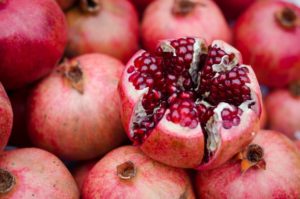 Pomegranates and berries may help to reduce the risk of inflammatory bowel disease (IBD). Researchers from the University of Louisville uncovered that a microbial metabolite, which is found in berries and pomegranates, can help to reduce the risk of IBD. Currently, there are minimal treatments available for IBD, which include Crohn’s disease and colitis.
Pomegranates and berries may help to reduce the risk of inflammatory bowel disease (IBD). Researchers from the University of Louisville uncovered that a microbial metabolite, which is found in berries and pomegranates, can help to reduce the risk of IBD. Currently, there are minimal treatments available for IBD, which include Crohn’s disease and colitis.
The researchers found that the microbial metabolite known as Urolithin A may help reduce the risk of IBD by increasing proteins that tighten epithelial cell junctions in the gut and reduce gut inflammation in animals. Tight gut junctions offer better protection against inappropriate micro-organisms and prevent toxins from leaking out, which can trigger inflammation.
Advertisement
The researchers found that Urolithin A doesn’t just protect against inflammation but may also reduce the risk of colitis.
First author Rajbir Singh explained, “The general belief thus far in the field is that urolithins exert beneficial effects through their anti-inflammatory, anti-oxidative properties. We have for the first time discovered that their mode of function also includes repairing the gut barrier dysfunction and maintaining barrier integrity.”
They’ve also studied other microbials. Other research found that the microbe Bifidobacterium pseudocatenulatum INIA P815 strain may help generate Urolithin A from ellagic acid, which is found in berries and pomegranates. Variations of Urolithin A may exist due to populations of bacteria that are responsible for the production of Urolithin A, which differ in each person. This is why some people develop IBD while other do not.
Research lead Venkatakrishna Rao Jala added, “Microbes in our gut have evolved to generate beneficial microbial metabolites in the vicinity of the gut barrier. However, this requires that we protect and harbor the appropriate gut microbiota and consume a healthy diet. This study shows that direct consumption of UroA or its analog can compensate for a lack of the specific bacteria responsible for production of UroA and continuous consumption of pomegranates and berries.”
Better understanding and additional research of Urolithin A may offer more insight into IBD along with providing improved treatment methods.
Also read: Inflammatory Bowel Disease Symptoms Reduced by Eating Strawberries
